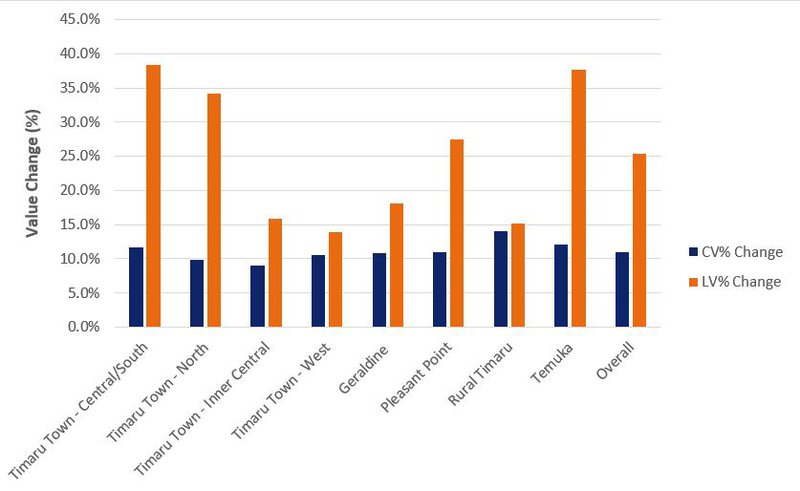New rating valuations for Timaru District

Timaru District property owners will soon receive a Notice of Rating Valuation in the post with an updated rating value for their property.
The new rating valuations have been prepared for 22,966 properties on behalf of the Timaru District Council by Quotable Value (QV). They show the total rateable value for the district is now $15,143,176,000, with the land value of those properties now valued at $7,706,422,000.
On average, the value of residential housing has increased 11% since 2017 with the average house value now sitting at $409,000, while the corresponding average land value increased by 26% to an average of $189,000.
QV valuer Brendon McCurley commented: “The demand for residential housing was buoyant across the district, with most townships seeing solid increases of between 9-14% overall. Demand for sections has also been strong and, as a result, land values have increased between 13.9-38.3% for the district overall.”
“We have seen decent value lifts across the entire residential market since 2017, with values still rising strongly. Lower value properties have seen the most competition from buyers, resulting in the greatest value increases.”
Residential housing value changes since 2017 revaluation levels:

Meanwhile, commercial property values have increased by 9.7%, and property values in the industrial sector have increased by 9.6% since the district’s last rating valuation in 2017. Commercial and industrial land values have also increased by 13.5% and 14.1% respectively.
“While there is demand from buyers for good quality properties with favourable leases in place, this has been offset to some degree by online competition for retailers and the start of a post lockdown trend for more people to work from home,” said Mr McCurley.
“There is steady value increases for industrial properties, and a limited supply of available industrial land within the region has seen a boost in land values.”
Since 2017, the average capital value of an improved lifestyle property has increased by 8.7% to $725,000, while the corresponding land value for a lifestyle property increased by 10.4% to $296,000.
“Lifestyle properties typically align in value with high-end residential properties and this segment of the market has been buoyant. A smaller market and less demand has meant there has not been quite the same increase in the land values as seen in the residential market,” Mr McCurley added.
Meanwhile, the rural market has seen reductions in values. Uncertainties around environmental issues and availability of capital are the main factors, with the dairy farm market seeing the largest decrease in value with an overall decrease of -14.9% in land value. Arable saw a -8.6% decrease in land values overall and for pastoral properties the decrease was -5.8%.
What are rating valuations?
Rating valuations are usually carried out on all New Zealand properties every three years to help local councils set rates for the following three-year period. They reflect the likely selling price of a property at the effective revaluation date, which was 1 September 2020, and do not include chattels.
They are NOT designed to be used as market valuations for raising finance with banks or as insurance valuations. They are independently audited by the Office of the Valuer General and need to meet rigorous quality standards before the new rating valuations are certified.
The effective rating revaluation date of 1 September 2020 has passed and any changes in the market since then will not be included in the new rating valuations. We note that average residential values are currently 5.1 % higher at the time of writing that they were in September, as measured by the QV House Price Index.
This means in many cases a sale price achieved in the market today may be different to your new rating valuation.
New rating values will be posted to property owners after 10 February 2021. If owners do not agree with their rating valuation, they have a right to object through the objection process before 19 March 2021.
Find out more about the rating revaluation and objection process.



